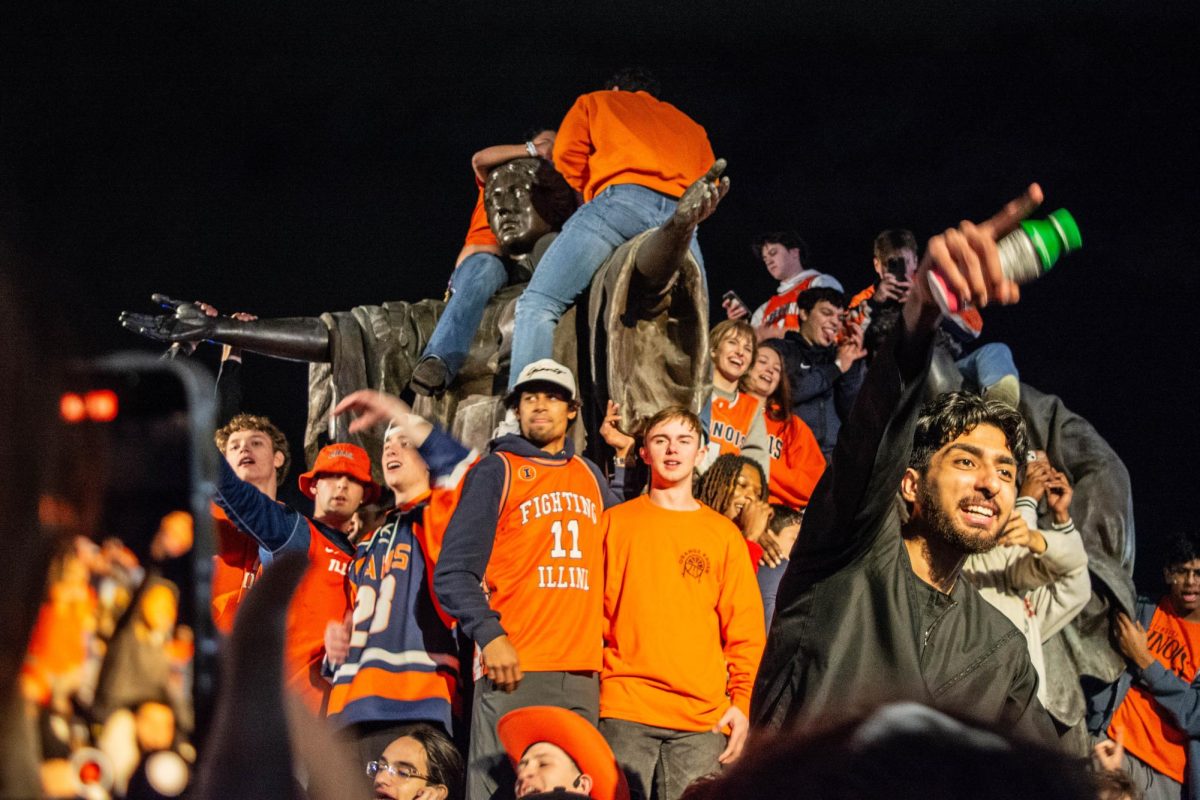Nathan Scheelhaase is always well aware of the weather for game days.
Illinois’ quarterback is enrolled in professor Eric Snodgrass’ severe and hazardous weather class, in which Snodgrass often gives a breakdown of Saturday’s forecast.
“I just want to make sure, since he’s taking my class in severe weather, that he knows what to expect on Saturday,” Snodgrass said.
Scheelhaase is often called out in lectures and used for class demonstrations or examples but said he enjoys participating.
“Things like that are cool,” he said. “I think when you get around classmates and the student body, and they just see that you’re a normal guy going to class just like them, that’s something that’s pretty cool.”
Get The Daily Illini in your inbox!
Snodgrass said he enjoys teaching student-athletes and that he’s impressed with their ability to perform in the classroom despite the extensive time commitment of their sports.
“They’re under an enormous amount of pressure to carry the weight of the Illini nation for their sport,” Snodgrass said.
Snodgrass said his experience with student-athletes has been positive but acknowledged the common stereotype of athletes that they’re just in college to play sports.
“I certainly think that stereotype is one that they have to work hard to break,” he said. “We don’t accept that here at Illinois. Other schools, maybe they let their students off easy. You come to Illinois, you’re going to get an education.”
Former Illini softball catcher Audrey Gallien said being extra attentive and participating in class can help dispel any misconceptions about athletes.
“That’s just showing that you’re serious about academics,” she said. “It takes a little bit more effort.”
Like Gallien, Scheelhaase said the perception of athletes in the classroom can be changed by their actions.
“People may think certain things about you, but when you receive a certain paper and walk across the stage with a gown and a hat on, it doesn’t matter what people say about you,” he said.
Tom Michael, associate athletic director for academic services, said he often tells athletes that their actions can either feed into negative perceptions or challenge them.
“We can’t change what people initially think, but we certainly have the ability with our students to change how they think after that,” Michael said. “That’s what we try to impress upon them.”
Academic support is provided by Illinois’ Division of Intercollegiate Athletics to help student-athletes work against these stereotypes. The support includes the Irwin Academic Services Center, located on Fourth and Armory streets.
Scheelhaase, Illinois’ student-athlete of the week from Sept. 26 to Oct. 2, said the center caught his eye when he was recruited.
“There’s not a lot of places like that around the country,” Scheelhaase said. “Irwin was one of those places where you knew it was something that would be beneficial to you as a student-athlete.”
Irwin is available to all student-athletes as a place to study and also provides services such as tutoring and academic counseling.
“The best comments that we get when we’re walking recruits and parents through the building is when a mom or a dad turns around and looks at you and say, ‘Really, there’s no reason for my son or daughter not to be successful academically,’” Michael said.
Michael, a former Illini basketball player, said these services and the academic reputation of Illinois are successful recruiting tools.
“Every institution isn’t this tough academically,” he said. “It’s something we don’t apologize for one bit.”
The University graduation rate is 84 percent, and Illinois’ athletes graduated at a rate of 77 percent, Michael said. He added that more than 60 percent of student-athletes had grade point averages of 3.0 or higher last semester.
Freshmen athletes are required to spend time each week at Irwin as well as meet with an academic counselor weekly. The hours vary by coach and the student’s progress academically.
“Our philosophy is that your actions will dictate how people are going to react,” Michael said. “You do a great job in the classroom, take care of business; you’re probably not going to have as many required hours. You continue to need that guidance; you’ll have some more required hours.”
Gallien said the softball program is among the strictest in terms of required Irwin hours. She said freshmen start with 12 hours per week and can potentially get two cut each semester. Gallien majored in anthropology and graduated with 3.84 GPA in the spring and finished her final semester with a 4.0, earning her Big Ten Distinguished Scholar honors. While she didn’t have any required hours her senior year, Gallien said she still took advantage of Irwin.
Kristin Kane, director of academic services, said the NCAA mandates that student-athletes can only spend 20 hours per week in their respective sports, but that number doesn’t include any time spent rehabbing injuries, watching extra film or meeting with coaches, which Kane said can make their time commitment to athletics equivalent to a full-time job.
While the time commitment is significant, athletes are not short of support and services to help guide them academically.
“We talk about those athletes giving us the 30 or 40 hours a week of work that they do for their sport,” Kane said. “This is kind of our way of saying, ‘OK, we’re requiring that of you, but then we’re going to help make sure that you’re staying on track of what you should be doing.’”








